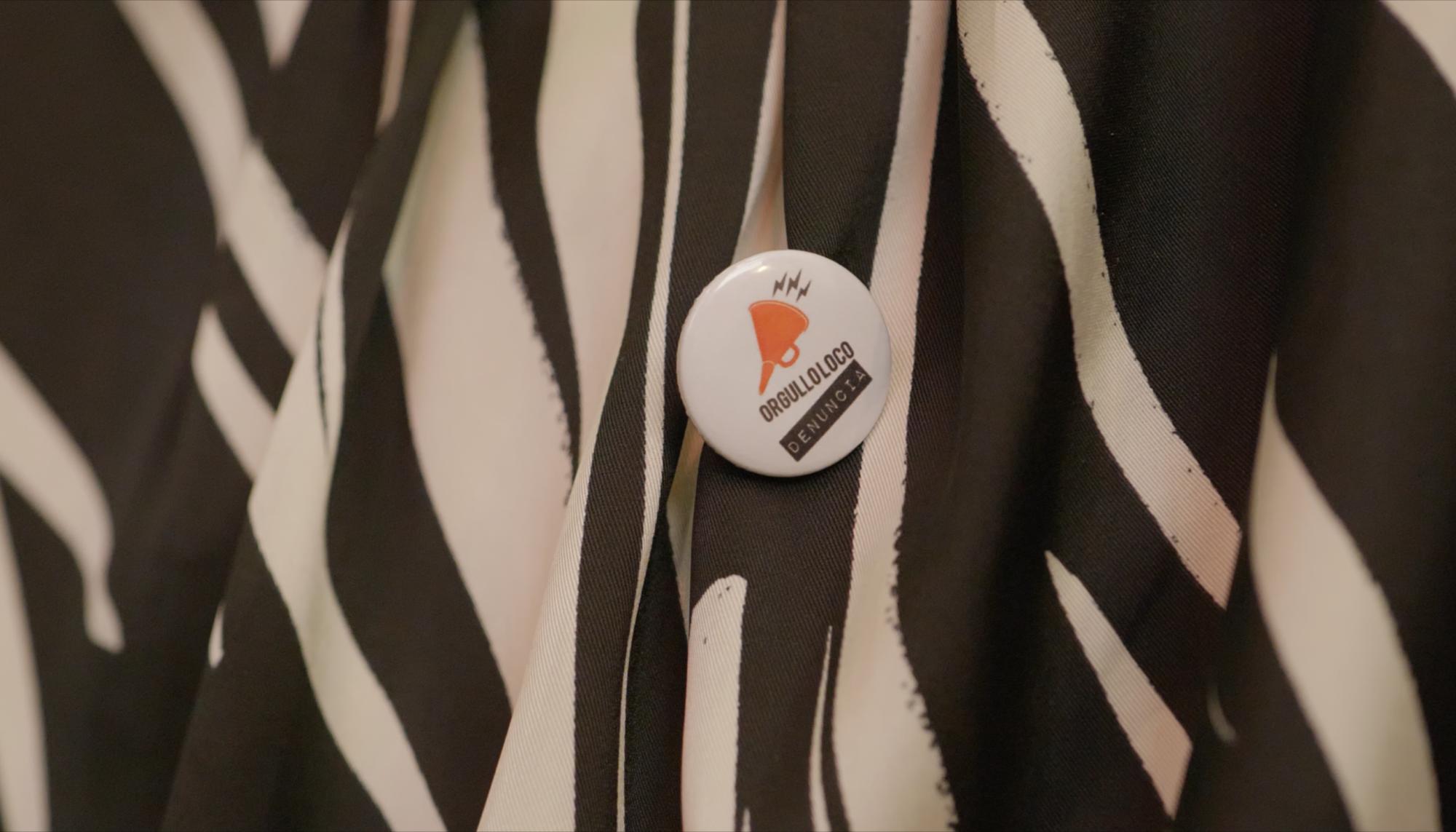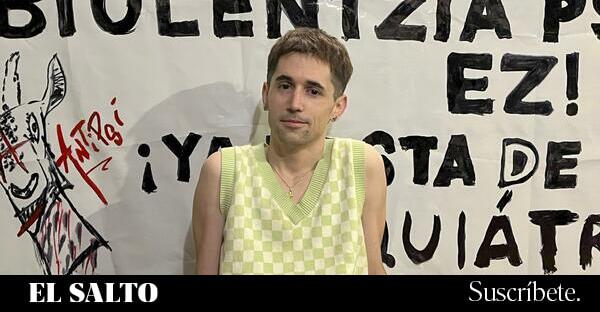

Heiko Elbira (1996, Madrid) is one of the organizers of the state-wide demonstration of Crazy Radikal Pride, which this year will be held for the first time in Bilbao, on Saturday, May 25 at 12 noon in Plaza Unamuno. The Mad Pride initiative was born in 1993 in Toronto to demand a new paradigm in mental health in which madness is neither pathologized nor punished. Graduated in Law and Politics and a member of CNT Bilbao, as a teenager he was psychiatrist and, like so many other people, Elbira did not find a solution in drugs and psychiatric practices, but in militancy that allowed him to understand that his discomfort had structural roots that They need a collective change. “Neoliberalism prefers to have people nullified, and that is what medication does: it nullifies you,” he warns.

You warn that the Basque Country has the highest rate of electroshock application, 1.39 per 100,000 inhabitants. I had no idea.
It catches a lot of people’s attention because it reminds them of movies. But the curious thing is that psychiatrists feel so much impunity with this psychiatric violence that they openly publish studies in scientific journals and recognize its use. In fact, if you go to the Basurto Hospital, they have electroshock machines, but no ophthalmologists on duty, for example. The high level of implementation in the Basque Country has to do with its level of economic development; it is a rich community with a broad neoliberal system, which also has an impact on psychiatric violence.
Psychiatrists, why do they say they are doing well?
The justification for electroshocks can be of various types and diagnoses vary according to trends. Now it is said, for example, that it can be used to treat depression. But there is no scientific basis to prove that this works, just like pills. In fact, there are scientific bases that warn precisely the opposite, that they are harmful in the long term.
You also denounce mechanical restraint. A practice that has more social resonance following the case of Andreas, a 26-year-old woman who died in 2017 in the psychiatric unit of the Central Hospital of Asturias.
She came in for meningitis, they thought it was schizophrenia, and she was tied to the bed for 75 hours, until she died. They killed her. Another case that has come to the media is that of Ivan de Arzúa, 31 years old. Last year they applied him against his and his family’s will. electroshock and mechanical restraint at the Conxo Provincial Hospital in Santiago.
Crazy militancy has been my salvation
All this reminds me of the recent case of Astigarraga, a 36-year-old man who died on February 2 after the intervention of the Ertzaintza and that the photos of his body suggest that the ertzainas subdued him with tasers. His family has reported the case to the court and the Ararteko.
It is the violence of power, both that of police forces such as the Ertzaintza, such as Psychiatry or Psychology. Anything goes against psychiatrized people. They tie you up, they annul you with psychiatric drugs and perform electroshock on you, they strip you of your most fundamental rights of this neoliberal legal system. A psychiatrist has more power than the Ertzaintza or the National Police, which, in general and theoretically, must be governed by regulations. If they arrest you, they have to take you to the police station, where you will have a lawyer and they will be governed by legal and political criteria to determine your freedom or imprisonment. But if a psychiatrist says that he will admit you and you become defensive and demand your right not to be admitted, in accordance with article 17 of the Spanish Constitution regarding freedom of movement, you can go to a court on duty and, if not You have money, they will assign you a court-appointed lawyer from the criminal court, but the judge will probably listen to the expert opinion, which is that of the psychiatrist who wants to lock you up. And they will lock you up without committing any crime.
Is Generation Z helping to break down stigmas about mental illness?
I would abolish the word stigma, especially since there is no such thing as mental illness. For something to be considered a disease, there must be a chemical alteration or organic changes in your brain. We live in such a neoliberal moment that the mental health discourse is very involved. But does that help break down stigmas? I don’t think so. In fact, I find it quite harmful. When I began to be active in social movements at the age of 16, the feminist movement reminded us that abusers are not mentally ill, but healthy children of patriarchy. Instead, now it seems that the solution is for them to go to a psychologist, providing an individual solution to a collective problem.

Mental health
Opinion In the face of silence, Crazy Pride
On May 25, the state demonstration of Crazy Pride will be held in Bilbao. They demand the end of coercion in Mental Health systems, that they stop torture and drugs, electroshock and that no one else be tied to the bed
So how should we look at mental health and discomfort?
The discomfort is real: you look like a picture, okay. But they are not an individual thing that can be fixed in therapy, with a consultation with a psychiatrist and with pills. You cannot navel-gaze and dwell on superfluous things when there are greater dramas in life, such as lack of money, work or housing. For example, women victims of sexist violence cannot be relegated to ending up in mental health resources. Why not give them money, find them a house, help them find a job and take care of the children? You don’t do that, you stuff them with pills and send them to feminist therapy, at best. Long-term medication is counterproductive because it becomes chronic and the approach to addressing discomfort must be structural. But of course, when the view is structural, what we have to do is change the economic model. Maybe we shouldn’t work so much and the neighborhood assemblies should be bigger. But neoliberalism prefers to have people nullified, and that is what medication does: it nullifies you.
The economic rhythm does not let you stop and it is necessary to stop, unionize and collectivize
How long have you been preparing crazy pride?
About five months. It is the first time that it has been done at the state level and it has been decided to do it in Bilbao, because we are going to decentralize it from Madrid. We have strength and people, people will come from Madrid, Barcelona, London, Paris, etc.
Is Bilbao a city aware of the discomforts?
Yes, I would say that she is even more combative than ever.
How do we replace the pills so as not to medicalize the discomfort?
I don’t have a magic wand, but the model doesn’t work and we could discover it together. Work is a stone in the road, a hindrance that prevents us from participating in politics, and women have a double work day, with work outside and inside the home. They give you the pills because you have a picture of life, regardless of whether you have an accident or something happens to you like being weak because someone has died. The economic rhythm does not let you stop and you need to stop, unionize and collectivize.
Do you make the famous phrase your own: you don’t need a psychologist, you need a union?
Yes, neither a psychologist nor a psychiatrist.
What union do you belong to?
To the CNT of Bilbao.
What have you found in political life that has brought you well-being?
They psychiatized me when I was 17 and told me it would be for life, stuffing me with pills and, since I didn’t believe it, I started meeting people, until I met the militancy of psychiatric survivors and I told myself “this is where I am.” I was going to get worse, that’s what medication and psychiatric violence have, which is why for me crazy militancy has been salvation. Now when they see me, they don’t believe it.
Is there hope then?
Yes of course. But it is not what the system offers you. Especially because in the health system the patient, or the client, is not you, it is the economic system itself. The working class turns to the health system to recover and get going, but the client is not us, even though there are professionals with very good will. And you don’t live on good will.

